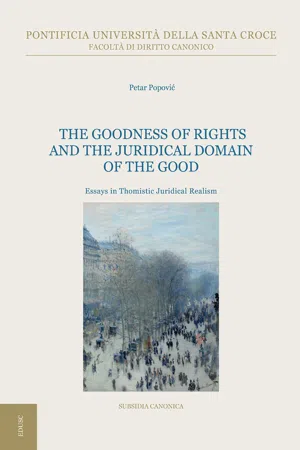
The Goodness of Rights and the Juridical Domain of the Good
Essays in Thomistic Juridical Realism
- 440 pages
- English
- ePUB (mobile friendly)
- Available on iOS & Android
The Goodness of Rights and the Juridical Domain of the Good
Essays in Thomistic Juridical Realism
About this book
This collection of essays, most of which are previously published in distinguished scholarly journals, explores the possible or necessary intersecting points between the concept of ius (the juridical phenomenon, in the broadest sense) and the concept of good. These intersections are first researched from the standpoint of Thomistic juridical realism. The author presents how these intersecting points establish the legal-philosophical framework for an analysis of topics such as the goodness of rights, the law's goodness, the juridicity of the common good, and the ecclesial juridical goods.The essays then bring into dialogue the Thomistic focal meaning of the concept of ius—namely, rights understood as rei-centric juridical goods—and other foundational accounts of the essence of the juridical phenomenon presented by scholars in the field of legal philosophy, Catholic social teaching, and canon law.Petar Popovi? was born in Rijeka, Croatia, in 1983. He is a priest of the Diocese of Pore? and Pula in Croatia, ordained in 2015. In 2008 he obtained a master degree in legal studies at the Faculty of Law, University of Rijeka, and in 2019 he successfully completed his doctorate degree at the Faculty of Canon Law, Pontifical University of the Holy Cross in Rome (Italy), where he currently works as an adjunct professor. He teaches and writes in the areas of legal philosophy, foundations of the law and rights in the Church, and deontology of canon law.
Frequently asked questions
- Essential is ideal for learners and professionals who enjoy exploring a wide range of subjects. Access the Essential Library with 800,000+ trusted titles and best-sellers across business, personal growth, and the humanities. Includes unlimited reading time and Standard Read Aloud voice.
- Complete: Perfect for advanced learners and researchers needing full, unrestricted access. Unlock 1.4M+ books across hundreds of subjects, including academic and specialized titles. The Complete Plan also includes advanced features like Premium Read Aloud and Research Assistant.
Please note we cannot support devices running on iOS 13 and Android 7 or earlier. Learn more about using the app.
Information
Chapter 1
The Focal Meaning
of the Concept of “Ius”
Table of contents
- Abbreviations
- A Note from the Author, Acknowledgements, and Credits
- Foreword
- Chapter 1: The Focal Meaning of the Concept of “Ius”
- Chapter 2: Natural Juridical Goods: The Juridical Status of Basic Human Goods in Aquinas’s Jusnaturalist Philosophy
- Chapter 3:The Goodness of Rights from Kelsen to Finnis and Beyond: The Concept of Rights as Juridical Goods
- Chapter 4: The Three Levels of Law’s Goodness and Then One More: Exploring John Finnis’s Account of Good Juridical Reasons for Action
- Chapter 5: Exploring the Aspects of Law’s Goodness in Ronald Dworkin’s Critique of the “Strong” Natural-Law Theory
- Chapter 6: Priority of the Legal Realm over Ideas of the Good: The Conceptual Status of Law and Rights in John Rawls’s Juridical Constructivism
- III. The Juridical Domain of the Common Good
- Chapter 7: The Juridical Domain of the Intrinsic Common Good of the Political Community: Hervadian Perspectives
- Chapter 8: Rethinking the Juridical Anthropology of the Family from the Viewpoint of the Bonum Commune Familiae
- Chapter 9: Bonum Commune Ecclesiae and the Juridical Domain of the “Things” That Are Made Common in the Church
- IV. The Concept of “Ius” in Catholic Social Doctrine and in Canon Law
- Chapter 10: Human Rights as Natural Juridical Goods and the Juridical Domain of the Principles of Catholic Social Doctrine
- Chapter 11: Some Proposals for Achieving a Greater Unity regarding the Conception of the Juridical Phenomenon in the Church
- Chapter 12: Canon Law, “That Which Ought to Be” in the Church, and the Ecclesial Juridical Goods
- Bibliography
- Subsidia Canonica